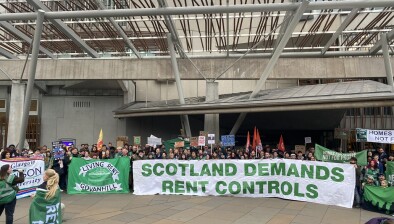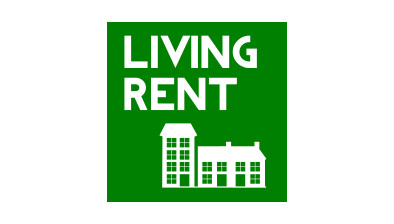Living Rent calls for action over concerns about end of rent cap

Tenants’ union Living Rent has called for further protections for tenants as the Scottish Government seeks consultation regarding measures to transition away from emergency legislation.
With the private rent cap implemented by the Cost of Living (Tenant Protection) (Scotland) Act coming to an end on March 31, an arbitration scheme has been unveiled that aims to avoid excessive private rent increases.
According to Living Rent, MSPs need to recognise the “tidal wave” of evictions and rent increases that face tenants and legislate to protect them before it’s too late.
It has called for continued emergency protections to stop landlords from increasing rents before rent controls come are introduced in the new Housing Bill.
The union has pointed to data from the Scottish Government published in November that revealed that between 2010 and 2023, rents across Scotland have increased on average by 51.6%. In some places, the increases are even sharper, in Lothian for instance, rent increased 79.3% and Greater Glasgow rent increased 86.2%. Inflation was only 45.7% during the same period.
With the cost of living crisis, tenants have faced even sharper increases. In the last year, rents across Scotland have increased by 14.3% to average £841 per month. In Glasgow, rents rose by 22.3% to average £1050 per month, in Edinburgh, rents rose by 18.4% to average £1192. This is among the highest year on year growth in the UK.
Living Rent secretary, Aditi Jehangir, said: “Tenants will be pushed to the edge by the end of the rent cap and eviction ban. The rent cap provided a bandage on a growing crisis but it did not address the fundamental issues.
“As the rent cap showed, when government regulation is not strong enough, landlords exploit every loophole and opportunity to increase rent whilst crying out that regulations are the problem. Let’s be clear, it’s landlords who have milked our need for a home by increasing rents beyond what we can afford.
“Tenants need action in the form of protections before the end of the rent cap and eviction ban in March or else we will see a tidal wave of evictions and rent increases.”
Under the adjudication method, any changes in rent must be based on one of the following three comparators:
- Open market rent.
- A landlord’s proposed rental increase.
- A new taper calculation that will specify a maximum ‘reasonable’ increase for that tenancy.
Tapering would only apply if a landlord’s intended rent increase was deemed unreasonable, and it would be determined by a percentage that would apply to such cases.
Calculations for each individual situation would be determined by the gap between the current rate of rent and the open market value of similar tenancies in matching properties. The tapering process ensures that there is an upper limit based on the highest percentage for adjudicated rents.






